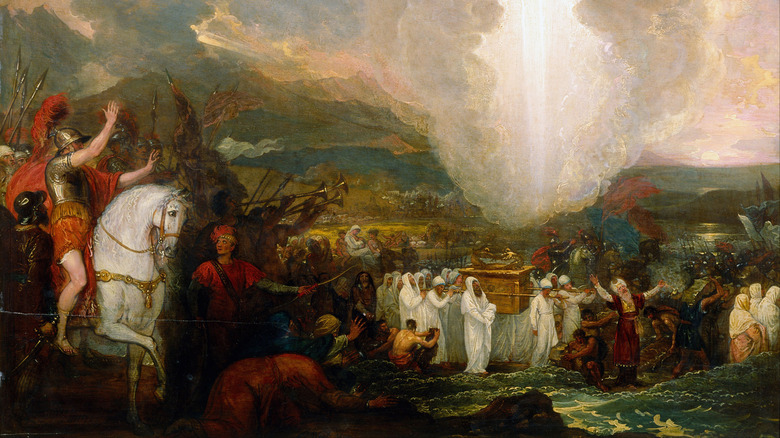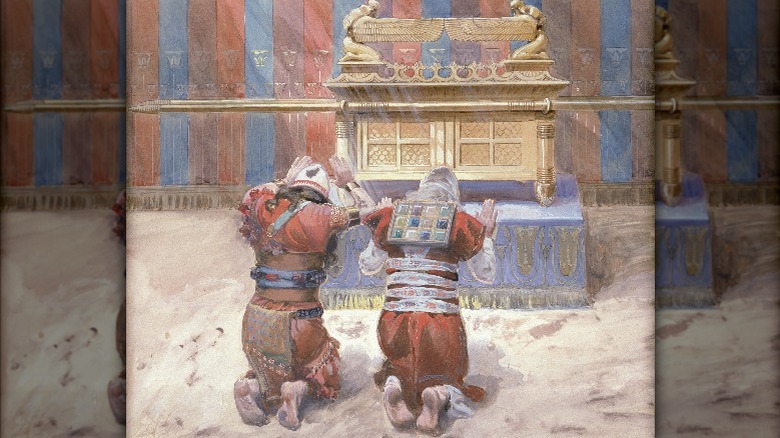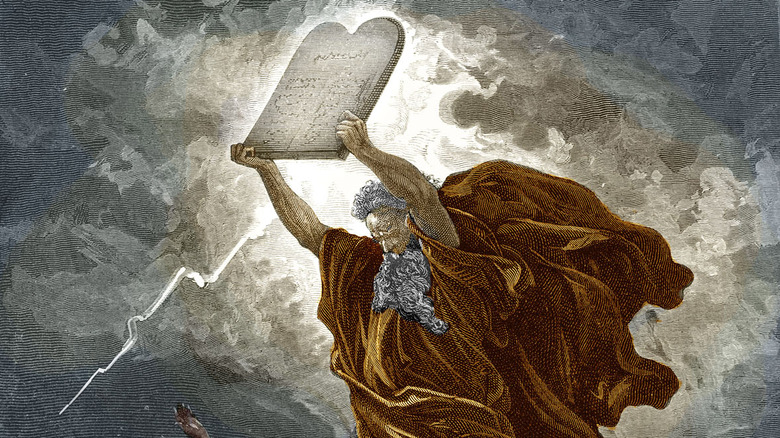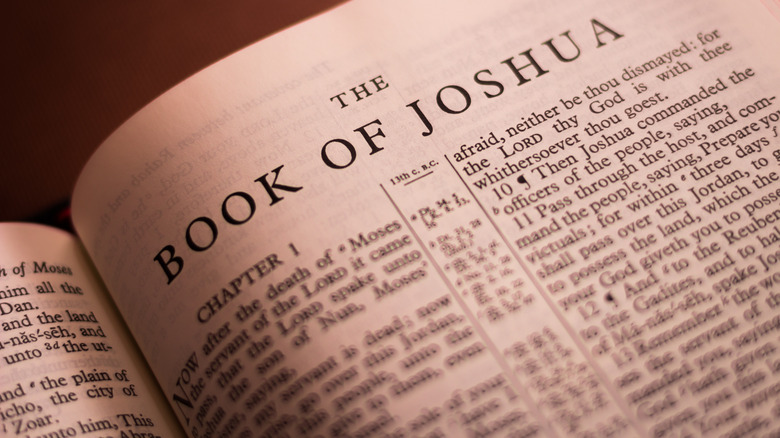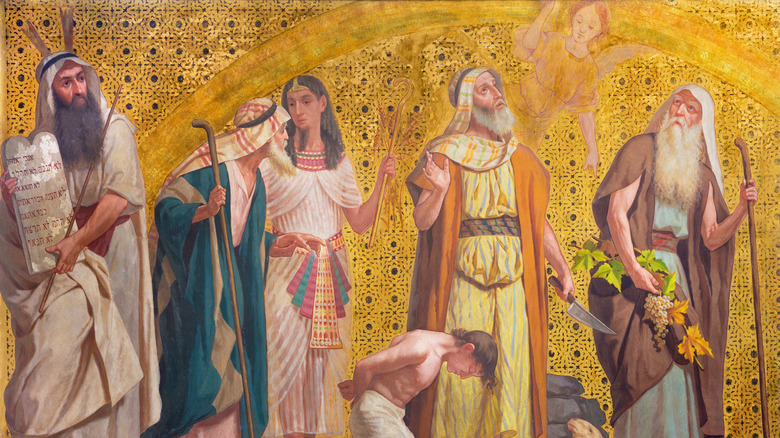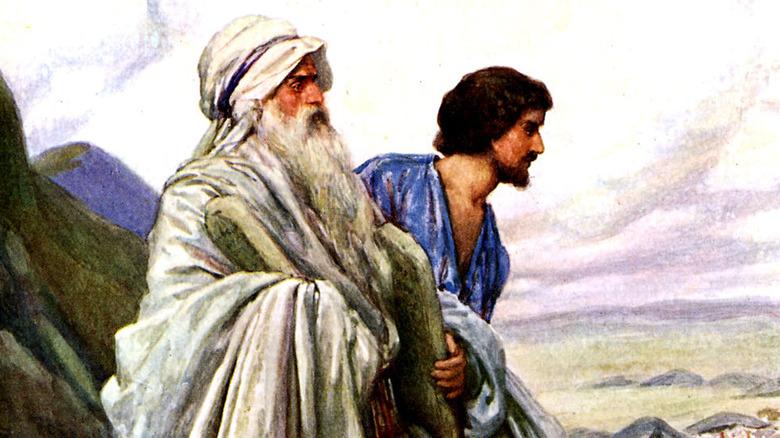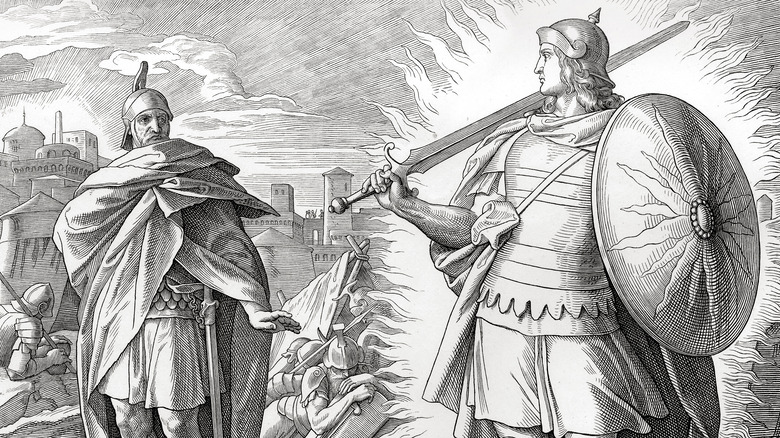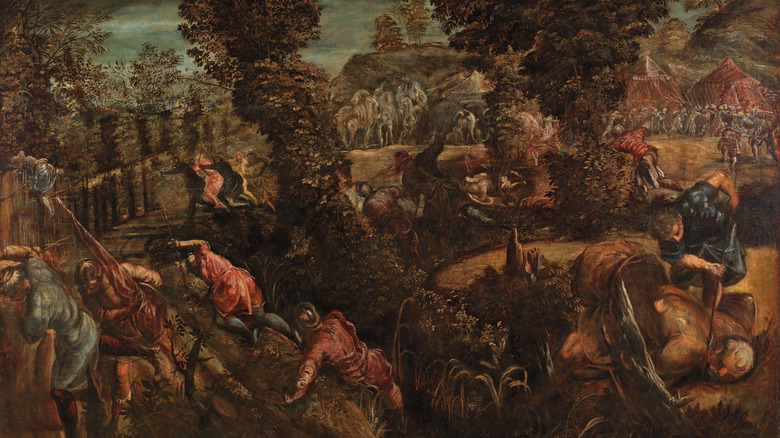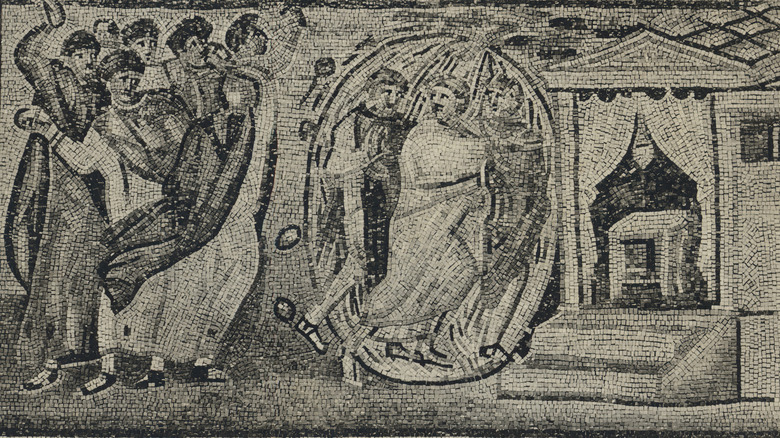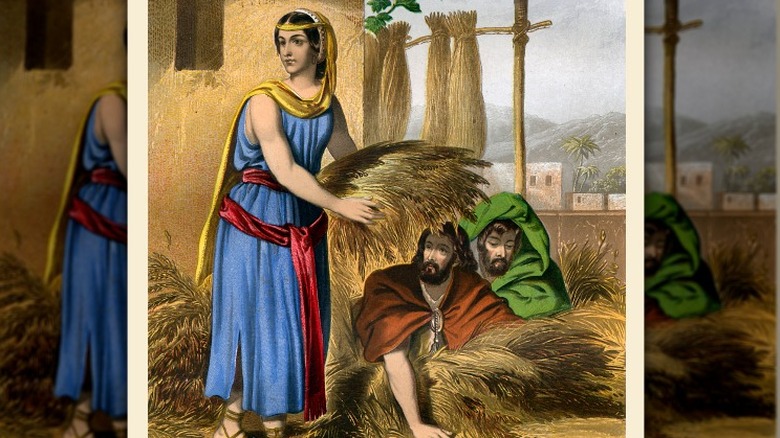The Untold Truth Of Joshua From The Bible
The Bible contains the stories of unlikely heroes who served the Lord no matter the cost. Names that stand out as iconic include Abraham and David, who cultivated such high levels of faith that mind-boggling stuff ensued. Abraham fathered a son at 100 and then sacrificed the kid without actually killing him, per Britannica. And need we mention David and Goliath? The odds were 10 to one against the skinny shepherd boy armed with a handful of pebbles, yet he went home with a giant's head (via Learn Religions).
Other biblical figures include Moses, whose obedience led to 10 plagues and the parting of the Red Sea, as per World History Encylopdia, and a sweet portrayal millennia later by Charlton Heston. Of course, Moses also famously led the Israelites out of 400 years of captivity in Egypt so that they could spend the next 40 years eating bread from heaven and complaining about their extended camping trip. It would take a lesser-discussed, though no less-celebrated. biblical character, Joshua, to finish what Moses started.
After the death of his master, Joshua led the Israelites into the land of Canaan, promised to them through God's covenant with Abraham generations before. While Joshua lacked Moses' showmanship, God accomplished great miracles through him, which included bringing the walls of Jericho crashing down and even making time stand still, according to Learn Religions. Keep reading for more about the untold truth of Joshua from the Bible.
Joshua exceled as the guardian of the door
If Moses had a teacher's pet, it was definitely Joshua, according Bible Review (via Biblical Archaeology). His perfect disciple's status is underscored by numerous biblical passages detailing interactions with white-bearded Moses. Exemplary obedience likely left other Hebrews calling Joshua a good assistant (ahem ... kiss up) behind his back. But it didn't really matter because nobody could get to Moses to complain about the favoritism anyway. In the Scriptures, Joshua remains a permanent fixture just inside the entrance to Moses' tent, guarding his master like a loyal watch dog.
Exodus 33:11 observes, "The Lord spake unto Moses face to face, as a man speaketh unto his friend. And he turned again into the camp: but his servant Joshua, the son of Nun, a young man, departed not out of the tabernacle." Stationed faithfully by the door, Joshua remained ever ready to protect his master and screen those who wanted access to him.
At the same time, Joshua showed plenty of respect for Moses, careful not to insinuate himself where he was unwanted or to overstep his position and role. That much can't be said for many of the other sand-logged Israelites. What's more, Joshua exuded both fierceness and dedication, and he was also careful to obey his master, learning through obedience and observation how to be an effective leader (via Lifeway Women).
He needed lots of encouragement
God and Moses showered Joshua with constant encouragement, according to Bible Review (via Biblical Archaeology). For example, Joshua 1 records the aftermath of Moses' death when Joshua takes the stage as the Israelites' new leader. To bolster him up, God gives Joshua an epic pep talk, rivaling anything coaches say in pre-game Super Bowl locker rooms. The constant and repeated theme of the passage is "Be strong and of good courage."
The Lord repeats this phrase many times. But he also reminds Joshua of the various ways he has already helped the Hebrew people and what he will do for them moving forward. God makes it clear that he still observes the original Promised Land covenant, and he reassures Joshua that he'll be the man to make it happen. Of course, this means saying bye-bye to free water, quail, and bread, per Exodus 16, and hello to uncertainty, as per Numbers 20.
Readers may question why Joshua needs so much encouragement, and so have authors like Elie Wiesel (via Bible Review): "Is it because, in his humility, Joshua felt so inferior to Moses that he believed himself inadequate, unqualified, and even unworthy to complete a task that only his master was capable of completing satisfactorily?" These are compelling questions that the Bible leaves unanswered. But what matters most is Joshua's response to the words of the Lord. He obeys him to the letter, demonstrating the same humility and fastidious devotion that he showed to Moses as the guardian of the door.
The servant became the leader at 60
Joshua was no spring chicken when he took the Hebrew helm. As per Crosswalk, he spent the first two decades of his life toiling under the heavy yoke of Egyptian servitude and the next 40 wandering in the wilderness with cantankerous comrades. All told, he tucked 60 years of service under his belt (as a relative nobody) before God bestowed a leadership role on him. Clearly, patience was one of his strongest suits.
This account also makes him an inspiring role model for individuals who bloom later in life. While today most people look at 60 as a few steps away from retirement, that's when things really started gearing up for Joshua. And he's far from the only person in history to find their calling later in life. After all, James Parkinson first identified Parkinson's disease at the age of 62, and Grandma Moses (aka Anna Mary Robertson Moses) didn't touch paintbrush to canvas until 76.
But nothing beats the example of Harry Bernstein, who wrote countless unpublished novels before getting his big break at 96, according to The New York Times. His memoir, "The Invisible Wall: A Love Story That Broke Barriers," delved into his impoverished childhood and what life was like for the working class in the early 20th century. Like Parkinson, Grandma Moses, and Bernstein, Joshua was patient and humble, waiting for years for the spotlight to fall on him. Moreover, age made him an ideal leader: well-qualified, meek, and wise.
Joshua had really big shoes to fill
The Old Testament makes it clear that no other prophet in Hebrew history rivaled Moses. Exodus 34:10 contends he was the only individual to know God on a one-on-one basis. When Moses neared the end of his life, it was vital he pass the mantle to the next generation of leader. No matter who he chose, the decision would be underwhelming in the eyes of the people. Talk about getting stuck between a rock and a hard spot.
In Deuteronomy 34:9, it reads, "And Joshua the son of Nun was full of the spirit of wisdom; for Moses had laid his hands upon him: and the children of Israel harkened unto him, and did as the LORD had commanded Moses." This passage emphasizes Joshua's receipt of authority — religious, military, and political — from God through Moses. But unlike Moses, Joshua had little else going for him. Raised as a slave, he didn't boast Moses' fine education as a member of Pharaoh's household (Exodus 2:10). He didn't have a strong prophetic gift, and he didn't carry a rod that turned into a snake.
Nevertheless, Joshua put his whole heart into leading the people and obeying God. And he showed unwavering courage despite endless change. Joshua's life was largely one of conflict and hardship without time to slow down, let alone rest. Fortunately, he had plenty of time to prepare for this role, and he did it with the same quiet resolve that carried him through life's other challenges.
Joshua witnessed incredible miracles
Although Joshua lacked Moses' prophetic chutzpah, he witnessed some of God's most eye-popping miracles, according to Bible Review (via Biblical Archaeology). In Exodus 24:9-10, Joshua accompanied 70 Hebrew elders along with Moses, Aaron, and Aaron's sons up Mount Sinai. Far from a normal hike, the Bible says, "They saw the God of Israel."
In Joshua 4:23, a repeat of the Red Sea crossing occurs at the Jordan River. Joshua led the Hebrews across the dry river bottom bringing them to the Promised Land. In Joshua 5:14-15, Joshua met with the captain of God's army. The angel commanded Joshua to go barefoot because of the sacred ground upon which he stood. This echoes the command Moses received after discovering the Burning Bush (via Exodus 3:5). But the miracles don't stop there.
In Joshua 6, God instructs Joshua to march around the walls of Jericho for six days, culminating in the blowing of trumpets at the right moment on the seventh. The instructions sound preposterous, but Joshua complies without hesitation or question. The walls of Jericho crash to the ground supernaturally. Other miracles include God's help winning the battle of Ai (Joshua 8:26) and sending hailstones to kill the Israelite's enemies in Joshua 10:11. But the showstopper of all showstoppers remains Joshua's audacious ask of God to make time stand still in Joshua 10:12-15. The Lord does, winning the battle for the Israelites.
A man of conflict and sorrow
The high point of 2000's "O Brother, Where Art Thou?" happens when three convicts — Ulysses, Pete, and Delmar — become radio stars performing the hit song "I Am a Man of Constant Sorrow" (via Screen Bites). For better or worse, they rise to fame as the Soggy Bottom Boys. While good old boys turned one-hit wonders have little to do with Joshua, the song they belt out could've been his anthem.
Joshua was also a man of constant sorrow, awash in a lifetime of bloody conflicts, per Bible Review (via Biblical Archaeology). He wore many hats as the patriarch of the Hebrews, and this role came with lots of physical and mental baggage. As a result, his biblical portrayal verges on the dark and unsettling: "To read his book is to move forward into the ashes, among disfigured corpses," writes author Elie Wiesel. While the Bible never delves too deeply into the personal impact of Joshua's military career, his CV has the makings for PTSD.
Grace Communion International points out that Joshua was ultimately a spiritual leader. So, we can only imagine the toll perpetual blood baths took on him. That said, the warfare was divinely sanctioned and decreed, per Seed Bed. But participants remained far from immune to the long-lasting consequences of vicious hand-to-hand conquest. Nevertheless, the presence of miracles helped rationalize the battlefield chaos. They also established God as the ultimate warrior who snatched the Israelites from their enemies' jaws time and again through acts both divine and impossible.
Joshua had a jealous streak
When it comes to biblical hot messes, Joshua doesn't really make the list. After all, he would have to compete with the likes of David and his scandalous dalliances with Bathsheba, Saul and his battlefied death, or Cain and his tantrum-fueled fratricide. Nevertheless Joshua's vigilant protection of Moses does go overboard, hinting at a jealous streak.
The episode happens in Numbers 11:26 when the Israelites are still stuck in the wilderness. God has provided them with manna from heaven and even flocks of quail for food, but the people feel unhappy, acutely missing the creature comforts of Egypt, albeit as slaves. After hearing Medad and Eldad have become preachers, prophesying around the Hebrew encampment, Joshua freaks out.
He orders Moses to stop them at all cost, even if it means imprisonment. But Moses will have none of it. In response, he rebukes Joshua, "Enviest thou for my sake? Would God that all the LORD'S people were prophets, and that the LORD would put his spirit upon them!" What a burn for a faithful servant who fosters little in the way of a prophetic gift. Of course, Joshua's mistake doesn't compare with Adam and Eve's removal from the Garden of Eden or the seduction of Samson by Delilah, and he suffers no consequences. There's no alteration in his relationship with Moses, and Joshua retains his teacher's trust and good reputation.
He commanded an army with no experience
Despite the jealousy episode, Moses betrays no doubt regarding Joshua's abilities, even in areas where he lacks experience altogether, as reported by Bible Review (via Biblical Archaeology). For example, Moses appoints Joshua as his chief military commander during the campaign against the Amalekites.
In normal Joshua fashion, he undertakes this unprecedented role with scrupulous attention to detail despite a pittance of military experience. But he doesn't let the lack of warrior accolades hinder his ability to work effectively for the Israelites. Instead, he places his faith in God, who the University of Arizona notes plays the role of the divine warrior.
As a result, Joshua's victories stem from obedience to God no matter how outlandish the command, according to Learn Religions. For this reason, there are few figures who better represent unquestioning obedience than Joshua. Even Abraham (Genesis 18) and Moses (Exodus 4) challenged God at times, arguing against plans to come. But Joshua remained faithful even when receiving truly bizarre-o instructions like those dealing with the fortified city of Jericho (via Learn Religions).
Joshua was one of the 12 spies
Years before his rise to leadership, Joshua served as one of the dozen spies sent to scout out the Promised Land, according to Learn Religions. Only he and Caleb returned from Canaan with favorable reports. As for the other 10 spies, they were a veritable mess, delivering negative reports that disheartened the people. According to Numbers 13, the frightful accounts of the 10 spies included descriptions of advanced civilizations they must conquer.
The spies told the Hebrews, "The people be strong that dwell in the land, and the cities are walled, and very great: and moreover we saw the children of Anak there. The Amalekites dwell in the land of the south: and the Hittites, and the Jebusites, and the Amorites, dwell in the mountains: and the Canaanites dwell by the sea, and by the coast of Jordan." The most noteworthy part of this passage is the mention of the sons of Anak. Hebrews knew this could only mean one thing: giants. The text elaborates that these hefty boys stood so tall they made the Israelites look like grasshoppers. Not a great report for instilling courage.
Of course, these accounts gave the Israelites serious pause, as reported by Bible Review (via Biblical Archaeology). Although Joshua and Caleb countered their words convinced they could enter the land and take it immediately, their words fell on deaf ears. Worse still, Joshua's and Caleb's dissent nearly cost them their lives.
The Israelites almost stoned Joshua to death
Overwhelmed by the negative reports, the people refused to listen to Joshua and Caleb, per Bible Review (via Biblical Archaeology). The crowd grew increasingly frustrated and agitated, crying out, "Would God that we had died in the land of Egypt! Or would God we had died in this wilderness!" (via Numbers 14:2).
Soon, frustration morphed into bloodlust as some of the more aggressive Hebrews attempted to stone Joshua and Caleb to death. But God intervened, condemning the people to spend 40 more years in the wilderness before entering Canaan. Forty years represented a generation, ensuring those who came out of Egypt would never see the so-called land of milk and honey, per The Torah. Sadly, this included Moses.
According to Elie Wiesel (via Bible Review), this day was preserved in the collective memory of the Jewish people as devastating because of the harsh judgment they faced. Not long after, the 10 spies who gave disheartening reports died mysteriously. But God's punishment did not extend to Joshua and Caleb who He promised would live to see the Promised Land.
Tradition says Joshua married a Canaanite prostitute
The Bible doesn't say much about Joshua's personal life, as not much is said about his wife or children, per Learn Religions. The focus remains on his military exploits. But the Jewish tradition really spices things up.
The embellishments stem from a story in Joshua 2:1 about Rahab, as reported by the Jewish Women's Archive. She made her living as a harlot. When two spies sent by Joshua show up unexpectedly at her house, she hides them from the king of Jericho on her house's rooftop. Buried beneath sheaves of flax, the spies go unnoticed by the king's guard. In return, they command her to place a scarlet thread or rope in her window so that when the Israelites attack, her household will be spared.
But the Jewish midrash and aggadah take Rahab's story much further. The midrash lists her as one of the most attractive women in history. Her house is described as existing in the actual city walls, providing access to clients both inside and outside Jericho. And after the city falls, she and her family join the Hebrew people, convert to the faith, and she marries Joshua. She's 50 to his 60 and has spent the past 40 years turning tricks, which makes the nuptials the most lurid thing Joshua has ever been involved in.
He died alone and forgotten
Despite all that Joshua did for the Israelites, he died alone, according to Bible Review (via Biblical Archaeology). Even worse, nobody took the time to attend his funeral. Judges 2:9 says he was buried at Har Gaash (Mount Gaash), considered an angry mountain or volcano. Jewish tradition attributes the anger to God, disgusted with the people for failing to commemorate their former leader.
As Elie Wiesel points out in Bible Review, once the Hebrews no longer needed Joshua to lead them in battle, they discarded him. It represents a pathetically accurate picture of fickle human nature. Interestingly, the Israelites' faith waned after Joshua's death. Judges 2:10-11 records that within one generation, they started worshiping Ashtaroth and Baal, returning to the pagan ways once followed in Egypt and alluded to in the infamous golden calf incident.
Apparently, Joshua wasn't the only one that the people chose to use and lose. They also treated God who helped them conquer Canaan the same way, forsaking him for local gods and goddesses worshiped by the Promised Land's previous dwellers.
